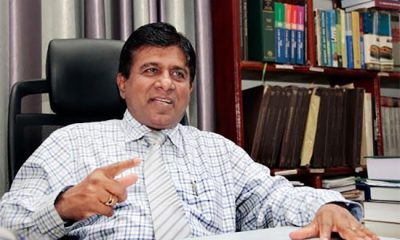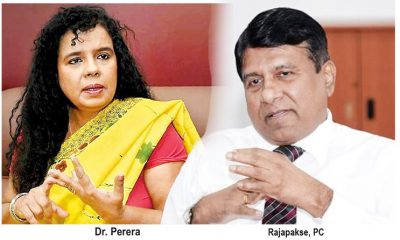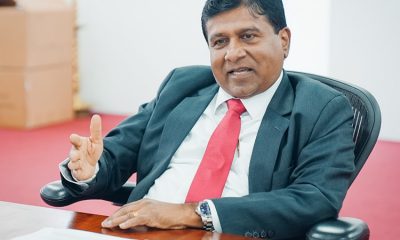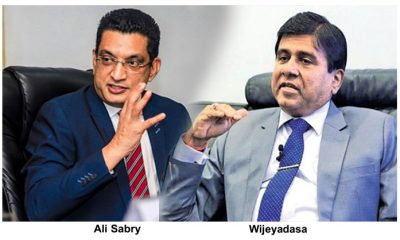News
Justice Minister says English remains medium of instruction at Law College
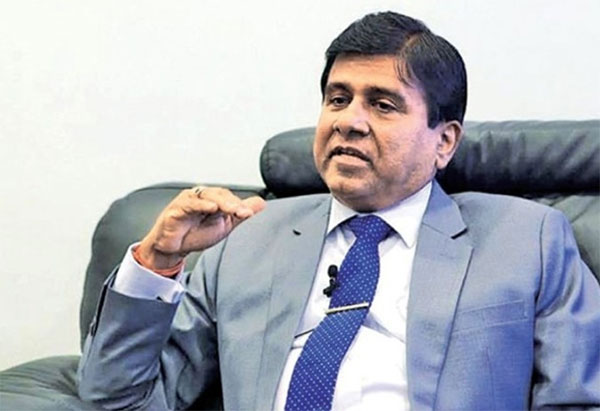
By Saman Indrajith
Justice Minister Dr. Wijeyadasa Rajapkshe told Parliament yesterday that, as per the existing laws, English is the medium of examinations in the Sri Lanka Law College.
The Minister said that it had been made mandatory for them to sit the examination only in the English medium from this year, as per the provisions of the Gazette Extraordinary No.2208/13 of December 30, 2020.
Dr Rajapakshe said so while responding to a question by SJB Ratnapura District MP, Hesha Withanage, who called on him to permit the Law College students to answer examinations in Sinhala or Tamil.
Minister Rajapakshe said that the need for teaching law subjects in the English medium, had been stressed by many legal experts, and scholars. There are some students who have been demanding that they be permited to sit the examinations in either Sinhala or Tamil. I have taken up this issue with the Chief Justice, who is also the Chairman of the Incorporated Council of Legal Education, under which the Sri Lanka Law College functions. The Chief Justice, thereafter, referred the issue to the Council’s Board of Studies, and the Board has decided that the Law College should conduct its examinations only in the English medium, and that should not be changed. I will take up this matter with the Chief Justice, again” the Minister said.
Chief Opposition Whip Kandy District MP, Lakshman Kiriella, said that the issue of changing the medium of instruction had been made by politicians and now there was a crisis. “The medium of instruction had been English until a decision made by a former government to allow students to sit examinations in Sinhala or Tamil. Then when the COVID-19 pandemic was at its zenith, and Parliament was not functioning, the government issued a gazette making it mandatory for the students to answer examinations in the English language. I received more than 15 telephone calls this morning from students asking me to speak on their behalf. It is unfair to make children pay for the follies of the government. Who destroyed this country’s education system by changing the medium of instruction in schools from English to vernacular languages,” Kiriella said.
Foreign Minister Ali Sabry PC said that at the Law College entrance examination candidates were given a language paper which they could answer in the medium of their choice – it could be English, Tamil or Sinhala. “However, after they enter the Law College, the students are expected to study in the English medium. Once the candidates become students, it is the responsibility of the College to turn them into competent lawyers. The students have to pass out of the College and compete. That they cannot do without ability to work in the English language. If we allow mother tongue as the examination medium, that would produce two types of lawyers – those who can speak and work in the English language and those who cannot work in the English medium. This would allow the children coming from villages to learn and master the English language and go out of the College with proficiency in the English language, in addition to their legal skills. When we tried to do this, the Opposition always disrupted it for political gain. In the medical profession, engineering profession, IT profession and Management the medium of examination is only English. Children would not learn English until we make it mandatory for the examinations. There are some who want to limit the English language proficiency only to the rich and upper class so that they could remain in the top. This is wrong. It has to be changed,” Minister Sabry said.
He said that politicians sent their children abroad to get LLB qualifications from foreign universities and let the local children study in their mother tongue at the Law College so that the former would always have an advantage over the latter.
News
US sports envoys to Lanka to champion youth development

The U.S. Embassy in Colombo welcomed the U.S. Sports Envoys to Sri Lanka, former National Basketball Association (NBA) and Women’s National Basketball Association (WNBA) players Stephen Howard and Astou Ndiaye, from June 8 through 14.
The Public Diplomacy section of the U.S. Embassy said that it would launch a weeklong basketball program intended to harness the unifying power of sports, made possible through collaboration with Foundation of Goodness and IImpact Hoop Lab.
While in Sri Lanka, Howard and Ndiaye, both retired professional basketball players, will conduct a weeklong program, Hoops for Hope: Bridging Borders through Basketball. The Sports Envoys will lead basketball clinics and exhibition matches and engage in leadership sessions in Colombo and Southern Province for youth aged 14-18 from Northern, Uva, Eastern and Western Provinces, offering skills and leadership training both on and off the court. The U.S. Envoys will also share their expertise with the Sri Lanka Basketball Federation, national coaches, and players, furthering the development of basketball in the country. Beyond the clinics, they will collaborate with Sri Lankan schoolchildren to take part in a community service project in the Colombo area.
“We are so proud to welcome Stephen and Astou as our Sports Envoys to Sri Lanka, to build on the strong people-to-people connections between the United States and Sri Lanka,” said U.S. Ambassador Julie Chung. “The lessons that will be shared by our Sports Envoys – communication, teamwork, resilience, inclusion, and conflict resolution – are essential for leadership development, community building, equality, and peace. The U.S. Sports Envoy program is a testament to our belief that sports can be a powerful tool in promoting peace and unity.”
News
Rahuman questions sudden cancellation of leave of CEB employees

SJB Colombo District MP Mujibur Rahuman in parliament demanded to know from the government the reasons for CEB suspending the leave of all its employees until further notice from Thursday.
MP Rahuman said that the CEB has got an acting General Manager anew and the latter yesterday morning issued a circular suspending leave of all CEB employees with immediate effect until further notice.
“We demand that Minister Kanchana Wijesekera should explain this to the House. This circular was issued while this debate on the new Electricity Amendment Bill was pending. There are many who oppose this Bill. The Minister must tell parliament the reason for the urge to cancel the leave of CEB employees,” the MP said.However, Speaker Mahinda Yapa Abeywardena prevented Minister Wijesekera responding to the query and said that the matter raised by MP Rahuman was not relevant.
News
CIPM successfully concludes 8th Annual Symposium

The Chartered Institute of Personnel Management (CIPM) successfully concluded the 8th Annual CIPM Symposium, which took place on 31st May 2024. Themed “Nurturing the Human Element—Redefining HRM in a Rapidly Changing World,” the symposium underscored the pivotal role of human resource management (HRM) in today’s dynamic global landscape. Since its inception in 1959, CIPM has been dedicated to advancing the HR profession through education, professional development, and advocacy, solidifying its position as Sri Lanka’s leading professional body for HRM.
Ken Vijayakumar, the President of the CIPM, graced the occasion as the chief guest. The symposium commenced with the welcome address by the Chairperson, Prof. Arosha Adikaram, followed by the Web Launch of the Symposium Proceedings and Abstract Book by the CIPM President. The event featured distinguished addresses, including a speech by Chief Guest Ken Vijayakumar, President of CIPM, and an address by Guest of Honor Shakthi Ranatunga, Chief Operating Officer of MAS Holdings Pvt. Ltd., Sri Lanka.
The symposium also featured an inspiring keynote address by Prof. Mario Fernando, Professor of Management and Director of the Centre for Cross Cultural Management (CCCM) at the University of Wollongong, Australia.
Vote of Thanks of the inauguration session was delivered by Dr. Dillanjani Weeratunga, Symposium Co-chair.
The symposium served as a comprehensive platform for researchers to present their findings across a wide range of critical topics in HRM. These included Cultural Diversity and Inclusion, Talent Development and Retention, Ethical Leadership and Corporate Social Responsibility, Adapting to Technological Advancements, Mental Health and Well-being at Work, Global Workforce Challenges, Employee Empowerment, and Reskilling and Upskilling.
The plenary session was led by Prof. Wasantha Rajapakse. Certificates were awarded to the best paper presenters during the valedictory session, followed by a vote of thanks delivered by Kamani Perera, Manager of Research and Development.
The annual symposium of CIPM was a truly inclusive event, attracting a diverse audience that spanned undergraduates, graduates, working professionals, research scholars and lecturers. This widespread interest highlights the symposium’s significance in the field of HRM, offering a unique opportunity for everyone to network and learn from scholarly brains.The CIPM International Research Symposium was sponsored by Hambantota International Port, Sri Lanka Institute of Information Technology (SLIIT), E B Creasy & Co. PLC, and Print Xcel Company.


